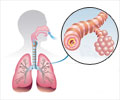Respiratory Syncytial virus (RSV) infections can be treated using a new vaccine that contains a highly attenuated RSV strain to protect against the virus.
Highlights
- Respiratory Syncytial Virus (RSV) can cause upper respiratory tract infections in children.
- Previous attempts in developing vaccines were found to be inefficient for RSV treatment.
- Scientists discover new version of the virus to be potent in producing protective antibodies against RSV infections.
"This is a promising live-attenuated vaccine candidate that merits further investigation clinically."
He also added that the next step of creating the vaccine requires clinical trials to study the safety and immunogenicity of the vaccine.
Respiratory Syncytial virus (RSV) is a common respiratory virus that causes respiratory tract infections like bronchiolitis, pneumonia. It is the number one cause of pneumonia death in children and one of the most important causes of infant hospitalization in the United States.
Previous attempts to develop respiratory syncytial virus in 1960 have backfired, and has worsened RSV infections in infants. Even, a recent clinical trial of protein-only RSV vaccines has shown disappointing results.
Moore said, "Achieving that balance is a challenge, "Weakening RSV by passage hasn't worked out satisfactorily. It turns out that for RSV, the natural virus does not induce a lot of immunity itself."
The research team has also removed or weakened other viral genes that promote infections and suppress the immune system. The modified virus is called OE4 stimulated high levels of producing antibodies.
The research team also used the procedure of codon-deoptimization to rewrite the viral genes. This procedure makes it less likely for the virus to change back to its original form.
While examining through the electron microscope, OE4 virions were found to be similar to the standard RSV virions. OE4 proteins had higher levels of immunogenic form of F protein and lower levels of another protein G.
The work was carried in collaboration with Elizabeth Wright, PhD, Emory associate professor of pediatrics and her team at Emory’s Robert P. Apkarian Integrated Electron Microscopy Core.
OE4 vaccines can completely protect mice against later infections caused by RSV virus. In contrast, when compared to the chemically inactivated RSV vaccine OE4 did not enhance lung disease in cotton rats. The animal studies were conducted at Baylor College of Medicine and Sigmovir Systems.
Respiratory Syncytial Virus (RSV)
- It is one of the most common cause of bronchiolitis (inflammation of the airways in the lungs)
- RSV infections may show symptoms within 4 to 6 days.
- Children under the age of 2 are at a higher risk for RSV infections.
- Complications of RSV infections may result in lung failure and pneumonia.
- Wash hands before touching the baby.
- Avoid contact with the baby if you have fever or cold.
- Do not smoke, as exposure to tobacco may increase the risk of RSV infections.
- Avoid kissing the baby to prevent RSV infections.
- Stobert.et.al. 'A live RSV vaccine with engineered thermostability is immunogenic in cotton rats despite high attenuation' Nature Communications ; (2016) doi:10.1038/ncomms13916
- Respiratory Syncytial Virus Infection (RSV) - (https://www.cdc.gov/rsv/about/infection.html )
- Respiratory syncytial virus (RSV) - (https://medlineplus.gov/ency/article/001564.htm)
Source-Medindia














